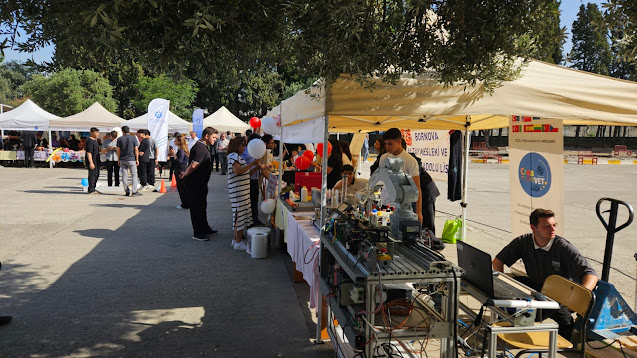CREAVET Skills
Competition: Students Reflect on AI and Smartphone Usage
As part of the Erasmus+
project CREAVET, students recently took part in a thought-provoking Skills
Competition that challenged them to reflect on a topic that’s shaping our world:
the pros and cons of Artificial Intelligence and/or smartphone usage.
Participants were invited
to write original essays exploring how these technologies impact our
lives—examining both the benefits they offer and the challenges they present.
The competition encouraged critical thinking, creativity, and effective
communication in English, aligning with CREAVET’s mission to enhance
21st-century skills in vocational education.
What made this task even
more special was the evaluation process: the best essays were carefully
selected by a commission composed of graduates from the Business English and
Communication study programme at Mykolas Romeris University (MRU) Sudovian
Academy (SUA). Their insights, experience, and academic background ensured a
fair and inspiring review.
Congratulations to all
participants for their thoughtful contributions and to the winners whose work
stood out for its clarity, depth, and originality. The winner was announced
Aiste, who used her creativity to describe a fictional character lost in their
reality living the sick person life in imaginary world. This initiative not
only highlights young people's perspectives on modern technologies but also
strengthens their ability to communicate ideas across cultures and contexts.
As part of the Erasmus+
project CREAVET, students recently took part in a thought-provoking Skills
Competition that challenged them to reflect on a topic that’s shaping our world:
the pros and cons of Artificial Intelligence and/or smartphone usage.
Participants were invited
to write original essays exploring how these technologies impact our
lives—examining both the benefits they offer and the challenges they present.
The competition encouraged critical thinking, creativity, and effective
communication in English, aligning with CREAVET’s mission to enhance
21st-century skills in vocational education.
What made this task even
more special was the evaluation process: the best essays were carefully
selected by a commission composed of graduates from the Business English and
Communication study programme at Mykolas Romeris University (MRU) Sudovian
Academy (SUA). Their insights, experience, and academic background ensured a
fair and inspiring review.
Congratulations
to all participants for their thoughtful contributions and to the winners whose
work stood out for its clarity, depth, and originality. The winner was
announced Aiste, who used her creativity to describe a fictional character lost
in their reality living the sick person life in imaginary world. This
initiative not only highlights young people's perspectives on modern
technologies but also strengthens their ability to communicate ideas across
cultures and contexts.
Problem Scenario Paragraph
Sometime in the future, in an unknown year, lived a man named Joe. Joe was your average, everyday guy. He had an average job and a family, just like everybody else. Everyday Joe woke up early, got ready, got dressed, had breakfast with his family, kissed his wife goodbye, hugged his daughter and went to work. He worked in an office job, typing away at the computer, at the end of the day he got home to his wife cooking dinner and daughter running up to greet him, eager to tell him everything about her day. And the next day he did it again and was happy to. An average guy, with and average job, living an average life and loving it, this is his dream, his paradise. Now how would you feel if I told you that all of that is a lie? To joe it’s the reality, however he’s actually hooked up to several machines that keep him alive with artificial supplements, with a set of virtual reality glasses over his eyes. He is one of the many people that are in this state… this future is far from the realm of possibilities, with how rapidly technology is progressing, phone addictions increasing and AI tools improving. When the internet was first introduced to the public it was hoped that it would make knowledge more accessible, when mobile phones were first introduced the were intended to improve communication amongst people, when AI was first introduced it was intended to be used as a tool to augment human capabilities, tackle complex problems, and potentially solve issues that exceed human limitations. However, in time the internet became a commercialised space filled not only with facts, but also with misinformation that could potentially be harmful, phones have improved communication, but now we have people getting addicted to their phones, and AI isn’t used as the tool that it was intended to be, rather, it is used as a shortcut, a tool to cheat and in some instances a replacement for a friend, whitch cost people real life connections.
Do you want to live like Joe? If not, there are steps to take to prevent that fate from coming to pass. If you use the internet as a source of information it’s important to implement source critique, when you find a source of information, make sure it’s credible and compare it to other similar sources. When it comes to using phones, limiting the time of its usage is key, of course, it’s not as easy as it seems, so start with small steps, start by shutting your phone off for five minutes, then increase the time gradually. Finally, when it comes to using AI, it’s important to use it as it was intended, a tool, not a shortcut and not a friend. We need to teach people, especially the younger generation how to use the AI tools properly. We need to prevent people getting attached to AI bots instead of actual people, encourage real life connections, real life experiences. As good as the grass may seem on the other side of the virtual reality glasses, Joe will never realise that he could have experienced a brighter, greener, softer and most importantly, real grass if he just took those glasses off before it was too late to do so. Let’s not be like Joe.






















.JPG)


